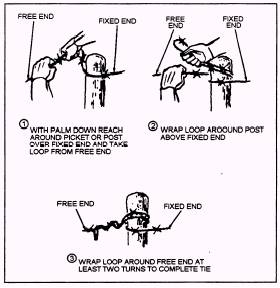|
TIES FOR ASSEMBLING ENTANGLEMENTS Wires are tied to pickets by men working from the friendly side of the wire
and picket, stretching the wire with the right hand as the tie is started. The
four ties used in erecting wire entanglements are shown in figure 8-13.
Top-Eye Tie
Use the top-eye tie to fasten standard barbed wire to the top eye of the screw
pickets. Make the top~eye tie with one continuous movement of the left hand
(fig. 8-14), while the right hand exerts a pull on the fixed end of the wire.
This is a secure tie, it is quickly made, and it uses only a short piece of
wire.
Intermediate-Eye Tie
Use the intermediate tie to fasten standard barbed wire to eyes other than
the top eye in screw pickets. Make it as shown in figure 8-15. This tie and
the other ties described below require more time to make than the top-eye tie,
and each uses several inches of wire. In making the intermediate-eye tie shown
in figure 8-15, the following points are especially important:
1. The right hand reaches over the fixed wire and around the picket with the
palm down. The left hand holds the fixed end for tension.
2. The loops are removed from the free end and wrapped around the picket.

Figure 8-16.-Standard barbed-wire apron tie.
3. One side of the loop should pass above the eye and the other side below
the eye.
Apron Tie
Use the apron tie whenever two wires that cross must be tied together. Tie
it in the same reamer as the post tie except that a wire is substituted for
the post (fig. 8-16).
Post Tie
Fasten standard barbed wire to wooden pickets or to the steel U-shaped picket
with the post tie shown in figure 8-17. Wrap the wire tightly around the post
to keep the barbs from sliding down. With the U-shaped picket, engage the wire
wrapping in a notch in the picket.

Figure 8-17.-Post tie.
This method is essentially the same as that of the intermediate-eye tie.
Barbed-Tape Splices
Connecting slots at each end of a 164-fbot reel provide a quick method of splicing
reels of barbed tape. You can also splice barbed tape by interlocking the twisted
barbs of two separate lengths, then completing the splice by twisting a short
piece of wire to each end of the area where spliced.
|

